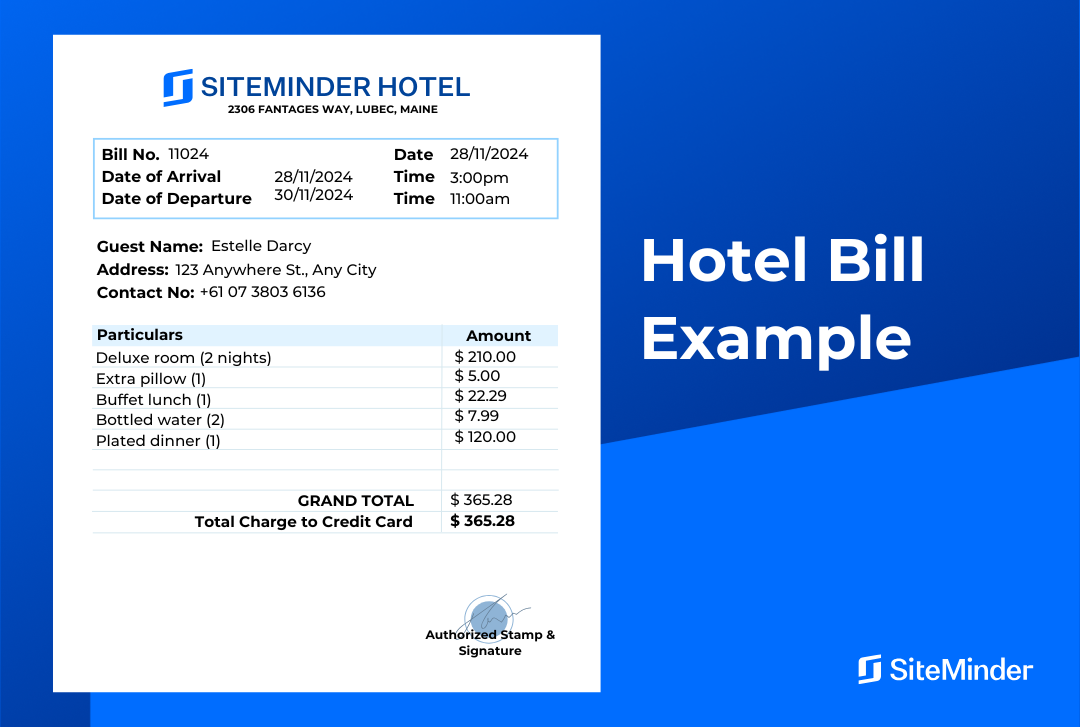What is a hotel bill?
A hotel bill is a document that summarises the charges incurred by a hotel guest, and forms a record of expenses for the guest to review at the end of their stay.
A bill is generated from a hotel folio, which tracks the charges that a guest incurs throughout their stay. At check-out the folio is converted into a bill that is given to the guest for them to review. If the guest is comfortable with all the charges outlined on the bill, it is then converted into an invoice for payment. Once payment is made, a receipt is generated as proof.
Who prepares the guest bill? That’s usually done during check-out by the front desk staff, to ensure that charges can be added to the folio right up to the very end of the guest’s stay.
Is a hotel bill an invoice?
No, a hotel bill is not an invoice – but it is the document that the guest invoice is generated from. What is the difference between a hotel bill and an invoice? The bill is what the guest reviews, and if all is well, the invoice is what the guest pays.
What is direct billing in hotels?
Direct billing is where a company or organisation is billed directly for a guest’s stay, rather than billing the guest at check-out. It’s a popular option within the corporate travel and tour operator sectors.
In this guide we’ll take a closer look at hotel bills, from how they work with your other systems and processes, to how your hotel can better handle guest billing.
Table of contents
The importance of hotel bills in preventing disputes
Prevention is better than cure for guest billing disputes. Some simple steps can help you to avoid issues at checkout, including:
- Implementing integrated systems that ensure folio data seamlessly and automatically goes where it needs to.
- Ensuring your staff are trained to efficiently and accurately update folios throughout a guest’s stay.
- Providing clear, itemised, easy to read bills at check-out, and running guests through all the charges.
- Offering guests multiple payment options so they can pay their preferred way.
Can you split a hotel bill?
Some hotels allow guests to split bills, others don’t. The choice is yours: it’s an option that many guests appreciate, but it can mean more work for you and your staff.
Integrate your chosen hotel billing tool with SiteMinder
Boasting 1350+ integrations, you can be confident that SiteMinder will seamlessly connect with popular hotel systems or apps that you can use to manage revenue.
Learn more
Hotel bill format: How to make a hotel room bill
How do you write a hotel bill? Generally speaking these documents are automatically generated by software, but it’s useful to know how to make a hotel bill should your power or systems ever go down.
No matter whether we’re talking a Hyatt hotel bill or a bill from a small, independent hotel, the document should feature:
- Hotel details: Business name, address, contact details.
- Guest details: Name, personal details.
- Itemised list of charges: Including room rate, food and beverage, additional services, taxes, fees, payments and adjustments.
- Notes: Offering relevant context and explanations for any of the information listed on the bill.
- Totals: Subtotal, tax and gross total.
What is a destination fee on a hotel bill?
A destination fee, also called a resort, amenity or facility fee, is a type of hotel charge meant to cover the cost of providing a wide range of extra amenities. A hotel should think carefully about charging such a fee, due to the questions it can generate from guests.
Hotel bill example
What does a guest bill look like? The hotel bill template below gives you an idea, although the look of your document will be determined by your hotel bill generator or tool.

Key principles of hotel billing management
By following these established hotel billing principles, you can minimise billing issues, protect your hotel’s reputation, and ensure that every guest leaves your property with a smile on their face.
1. Ensuring compliance and data security in hotel billing
It is absolutely essential that you follow all relevant rules and regulations to safeguard your guests’ personal and financial data and work to prevent fraud and privacy issues.
2. Enhancing guest satisfaction with transparent billing
By creating a clear, itemised bill, you reduce guest confusion and show yourself to be a trustworthy business.
3. Addressing complex billing scenarios
You need to establish accurate but easy to follow procedures for effectively managing complex billing situations like split bills, third-party billing and the use of multiple payment methods.
4. Training staff about operational excellence in billing management
Train your staff on how to create bills, explain bills and effectively handle billing objections.
5. Dealing with hotel bills for group bookings or corporate accounts
Special billing procedures will need to be established, and specialised billing software may need to be implemented, for groups and corporate clients who want to pay for multiple guests.
6. Handling recurring charges for long-term or extended stays
Implement periodic billing, say once a week or month, to ensure that long-term guests don’t accrue too many unpaid charges.
7. Leveraging technology to streamline billing processes
Implementing automated systems streamlines your billing processes, reduces human error and frees up your team to spend more time on enhancing the guest experience.
8. Using billing data for revenue growth and guest personalisation
Billing is a goldmine of guest data. By analysing it, you identify trends, optimise your pricing, and generate insights on what your guests want from their stay.
Benefits of an interconnected hotel billing system
What is a hotel billing system? It’s the tool that you run your billing through (and usually your folios, invoicing and receipts too). An interconnected hotel billing system, meanwhile, is one that connects seamlessly with the other tools in your hotel tech stack. This allows data to flow freely between your billing tool and all your other solutions, driving a wealth of benefits, including:
- Improved accuracy: It reduces manual errors by automatically updating guest charges and payments across your hotel as they happen.
- Faster processing: It seriously speeds up check-in and check-out for both guests and staff.
- Enhanced guest experience: It reduces errors, confusion and wait times.
- Better financial reporting: It facilitates more accurate and comprehensive revenue tracking and reporting by generating a wealth of detailed data.
- Streamlined operations: It brings together multiple services across multiple departments (room, restaurant, day spa) in a single, unified system.
And if you’re looking for the ultimate centralised experience, there’s no hotel tool quite like SiteMinder.

